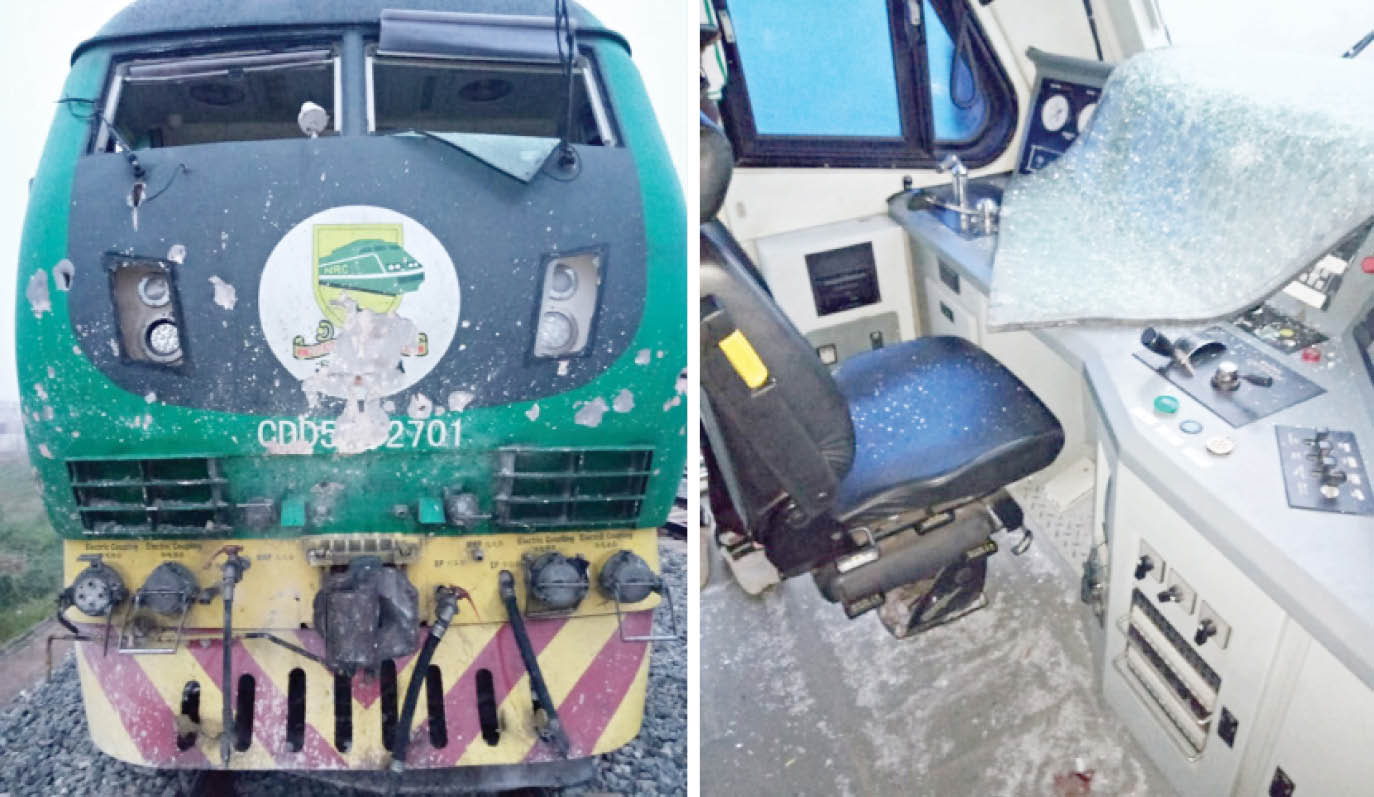Take Abuja-Kaduna rail attacks seriously
The terror attack on the Nigeria Railway Corporation (NRC) rail track on Abuja – Kaduna line, and damages to its train’s windshield and engine on Wednesday and Thursday last week, blew away the hope among Nigerians that the days of Islamic States of West Africa Province (ISWAP) and Ansaru terror groups are actually numbered. More […]

FILE PHOTO
The terror attack on the Nigeria Railway Corporation (NRC) rail track on Abuja – Kaduna line, and damages to its train’s windshield and engine on Wednesday and Thursday last week, blew away the hope among Nigerians that the days of Islamic States of West Africa Province (ISWAP) and Ansaru terror groups are actually numbered. More significantly, it has also shattered to shreds the sense of security among travellers who use the train service as a strategy for evading pestiferous bandits and kidnappers who have infested Abuja-Kaduna highway in recent years and seem to have defied security strategies.
Commuters on the train from Kaduna told tales of tension-soaked moments, as they heard loud explosions from dynamites planted by terrorists and the harrowing experiences of having to wait for about six hours in deserted areas, without adequate security to defend them from any unforeseen attack by bandits. Their ugly experience testified to the shoddy security arrangement on the train and the absence of system at the NRC, in spite of the hype by government about its revitalization of train service in Nigeria.
- PODCAST: A Deeper Look At How Some Nigerian Elites ‘Siphon’, Hide Loots
- Podcast; Is NCC Really Banning Persons Under the Age of 18 From Obtaining SIM Cards?
The incidents on Wednesday and Thursday should not have been unexpected, as there had been reports of attempts by bandits to violate security on Abuja-Kaduna train service. Also, security operatives have revealed that they had intercepted and neutralised terrorists attempting to blow up bridges and rail tracks around the Kaduna axis of the rail line, in order to kill the people on the train. Earlier this month, Niger State Governor Sani Bello, raised the alarm about the infiltration of many communities in the state by Boko Haram, whose violent signature includes bomb attacks on government facilities. In spite of these intelligence reports, security operatives did not take adequate steps to frustrate the twin attacks on the NRC track and train last week.
Terrorists and extremists all over the world, including the the Islamic State of Iraq and (greater) Syria (ISIS) and al-Qaeda in the Arab Peninsula (AQAP), two groups associated with Boko Haram and ISWAP, exhorted their followers around the world to derail trains. Such derailments are intended to cause casualties, while attacks on tracks and other right-of-way infrastructure are primarily intended to cause disruption and attract attention.
Terrorists could combine derailment of train with assault attack on passengers. For instance, on August 10, 2001, UNITA rebels in Angola in a single train derailment and attack led to the killing 259 while 412 persons were declared missing. Other countries where terrorists have caused the derailment of trains and attacked passengers include Syria, Iraq, Pakistan, Algeria, Mozambique, and India. A 2018 report by San Jose State University, said “bombs were the preferred method of derailing trains, accounting for 212 (or 75.7 percent) of the 282 attempts. Ten additional incidents saw derailments using explosives combined with subsequent armed assaults on the passengers, bringing the total of bombings to 75.9 percent.”
Security agencies and the NRC must not treat last week’s attack on Abuja-Kaduna rail with levity, as it could be a new phase of terror attack in the country. The Abuja-Kaduna rail project is the pride of this government, as it has gulped some $874 million, about $500 million of which is debt owed the China’s Exim Bank. Since it was opened in 2015, passenger traffic on the rail line has continued to increase, especially, due to the spate of bandit attacks and kidnapping on the main Abuja – Kaduna expressway. The recent attack could dwindle confidence on the train service, causing massive loss of revenue needed to repay the loan from China. For the security of their lives, many Nigerians may choose the alternative in paying the relatively high air fare on the short distance between Abuja and Kaduna.
We call on the NRC and security agencies to return to the drawing board and put in place intelligence gathering mechanisms and refined security architecture to forestall this new threat. It will not be out of place to plant state agents in communities around the standard gauge rail line that connects the FCT with Kaduna, to monitor subterranean activities of bandits and terrorists in rural communities. It is less expensive to prevent terror attacks than to suffer huge losses in human lives and multi-billion Naira NRC facilities.
